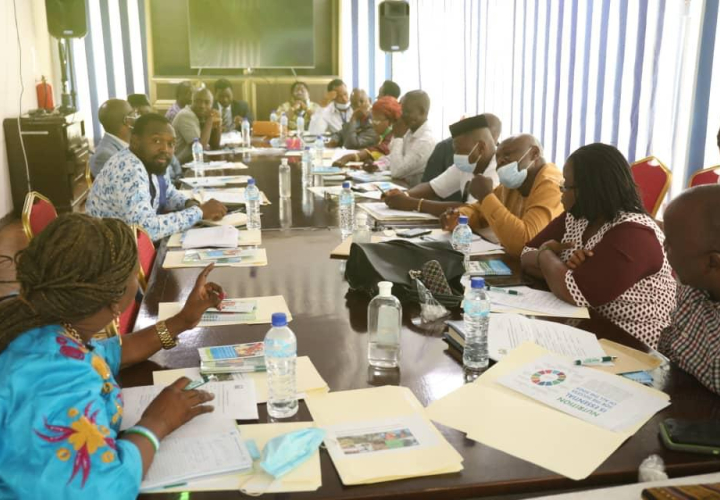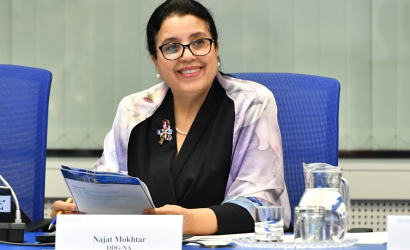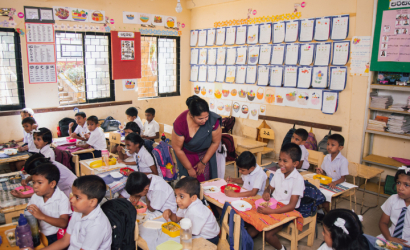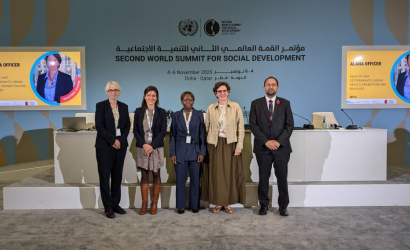REACH has a history of supporting parliamentarian engagement in the fight against malnutrition in Sierra Leone. Over the years, it has worked to galvanize the UN agencies belonging to the UN Nutrition collective (formerly UN Network) and other members of the development community, such as Irish Aid, to bolster efforts in this camp. Maps that illustrate regions where child wasting, stunting and other forms of malnutrition are concentrated and dashboards that depict intervention coverage levels have been developed to bring these issues into focus for members of parliament (MPs) and convey the urgency to act, including during these COVID-19 times. This has also paved the way for nutrition to be included in the Medium-Term National Development Plan (2019‒2023) and nutrition-sensitive legislation to be enacted, such as the Food and Feed Safety Bill in 2017. However, to make a lasting difference and address the country’s triple burden of malnutrition, these advocacy efforts need to be sustained, particularly as new parliamentarians are voted into office.
Here is a glimpse at how this took shape on the ground during the last several months as well as some future activities planned, thanks to funding from Irish Aid. Essentially, it’s a string of sequenced encounters that have helped to keep nutrition on the political agenda despite the COVID-19 pandemic. These endeavours are also contributing to the preparations for the Nutrition for Growth (N4G) Summit in December 2021 and pushing stakeholders to mobilize SMART commitments. Furthermore, the approach embraces opportunities that emerge in the country’s political landscape.
“Parliamentarians can play a significant role in contributing to the fight against hunger and malnutrition since they are the lawmakers. It is our responsibility to engage them so that they promote laws and legislations that can have impact on nutrition,”
says Marian Bangura, the REACH facilitator in Sierra Leone. She went on to explain that the focus of REACH’s advocacy efforts to engage parliamentarians is to increase domestic budgetary allocations for nutrition.
In August 2020, the REACH facilitator met with the Leader of Parliament to discuss prospects for engaging the incoming chairmen of the agriculture, education and health committees in the national nutrition agenda. As part of the REACH workplan, the facilitator was working with the national SUN Secretariat to organize a parliamentarian workshop in late 2020. The efforts picked up momentum the following month, when a consultant (former REACH Facilitator), who has a good affiliation with parliament, the National SUN Coordinator and current REACH Facilitator jointly met with the Leader of Parliament, and later, with the Clerk of the House, enabling the plans for the workshop to proceed.
The workshop took place on 11 November 2020, attracting fifty members of parliament and representatives from various ministries, departments and agencies of government, UN agencies and civil society. The chief aim of the meeting was to motivate parliamentarians to support actions that enable a conducive political and financial environment for reducing malnutrition in Sierra Leone. As such, it provided a venue to advocate for the enactment of the Code on Breastmilk Substitutes and legislation on food fortification. It also provided a forum to discuss the ongoing COVID-19 response, which underscored the relevance of ‘the Code’. WHO and UNICEF guidance recommends that mothers suspected or known to have COVID-19 should continue breastfeeding and ‘the Code’ is an instrument to ensure that companies don’t use the COVID-19 crisis to promote their baby formulas.
It was about eight months into the pandemic and the workshop outlined nutrition issues that Sierra Leone is facing, including the effects of the COVID-19 pandemic.
“The parliamentary workshop was a milestone for SUN in that it brought together both parliamentarians and development partners to bring to the attention of members of parliament the nutrition and food security situation in the country and the role they can play in reducing the problem,”
states Nenebah Jalloh, the National SUN Coordinator, who is based in the Office of the Vice-President. To further ensure that participants were on the same page, context was provided about the SUN Movement, including Sierra Leone’s involvement and key achievements since it joined in 2012. The causes and consequences of malnutrition were explained from a human development and economic perspective. Possible solutions were also highlighted, which segued into an open dialogue about the roles and responsibilities of parliamentary committees in the fight against malnutrition.
Ultimately, these efforts culminated in the formation of a parliamentary caucus on nutrition, which will both advocate for nutrition issues in Parliament and serve as nutrition champions for their respective constituencies in the country. The caucus is comprised of twenty-two parliamentarians, hungry for change. Honourable Aiah Kasigbama was motivated to join the parliamentary caucus on nutrition because,
“Health is wealth – good health for our children and mothers is our priority, and that’s why the caucus is of importance to us as MPs.”
A follow-up meeting was held with the new parliament on 21 April 2021, where MPs came forward with a declaration of commitment for an improved nutrition landscape in Sierra Leone, signed by the Speaker of Parliament and members of the caucus. Key visuals from the REACH-supported Multi-sectoral Nutrition Overview and the mapping exercise were used to help frame the solution-oriented discussion. While this affirmed political support for nutrition and is an encouraging signal from government during the Year of Action on Nutrition, it was not yet time to rejoice.
According to the 2020 joint child estimates published by UNICEF, WHO and the World Bank, approximately, 26.8% of children under five years old are stunted while 5.4% of under5s were wasted in 2019, a statistic that has likely risen in view of the COVID-19 pandemic. The Global Nutrition Report shows that nearly half of adult women in Sierra Leone were overweight or obese in 2016, an emerging risk factor for severe forms of COVID-19. Key challenges and support needed from the caucus were cornerstones of the parliamentary discussion in April. This helped to finalize the Terms of Reference of the new caucus, developed with REACH support, which were endorsed during the meeting with some modifications.
The caucus members are now working to devise an action plan to guide their efforts in 2021. While the details remain to be defined, below are emerging key actions and priorities that are likely to feature in the plan.
- Advocacy for the creation of a nutrition budget line for Directorate of Food and Nutrition under the Ministry of Health and other relevant ministries, departments and agencies of government
- Advocacy for an increase in budget for national SUN Secretariat to strengthen nutrition governance and its ability to coordinate action across sectors and stakeholder groups
- Support to formally present the bill on the Code for the Marketing of Breastmilk Substitutes in parliament and its enactment
- Articulation of a governance structure for the new caucus, including its relationship to the national SUN Secretariat
Looking ahead, the REACH facilitator together with the member agencies of UN Nutrition in-country will also be encouraging the Government of Sierra Leone to make a pledge in the lead up to the N4G Summit. Efforts are already being arranged to table this at the forthcoming SUN steering committee meeting. The UN agencies are also discussing possible N4G commitments, with plans to launch a new joint programme on nutrition later this year, subject to the availability of funding. The joint programme seeks to reduce stunting by employing an integrated and multi-sectoral approach to nutrition. It places an emphasis on strong coordination between five UN agencies (FAO, IFAD, UNICEF, WFP and WHO)
“to ensure that value for money is achieved with the joint programme,”
says Marian. In this way, it acknowledges that the success of efforts supported by the individual UN agencies is dependent on those of its sister agencies, given that the causes of malnutrition are multifactorial and interrelated.
The above nutrition advocacy is part of greater efforts that REACH is supporting to improve multi-sectoral nutrition governance and raise awareness about the devastating effects malnutrition has on the country. When reflecting on the future, Marian sees opportunities to strengthen country capacity from knowledge management at the SUN Secretariat to sub-national level coordination. Strong country leadership is not only a key aspect of SUN 3.0.
“This is very key in implementing the action plan that we are eagerly waiting for from the Caucus. Advocacy without Action is just an illusion. The children of Sierra Leone will hold us all accountable,”
says Yvonne Forsen, Deputy Country Director of the World Food Programme, who also chairs UN Nutrition in Sierra Leone.
With the UN Food Systems summit in September and the N4G Summit in December, this year offers unique opportunities to wave the nutrition flag high and remind policymakers that nutrition is a sound investment, offering a potential USD 16 return in every USD 1 invested. Those numbers are attractive in the financial world and become even more compelling when considering that people’s welfare is at stake.



